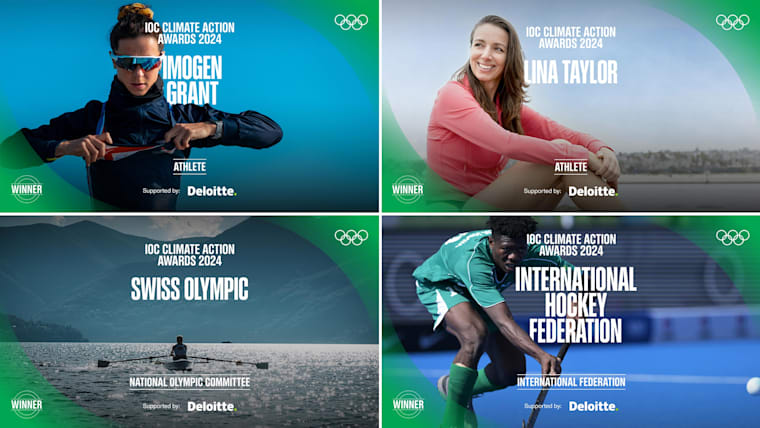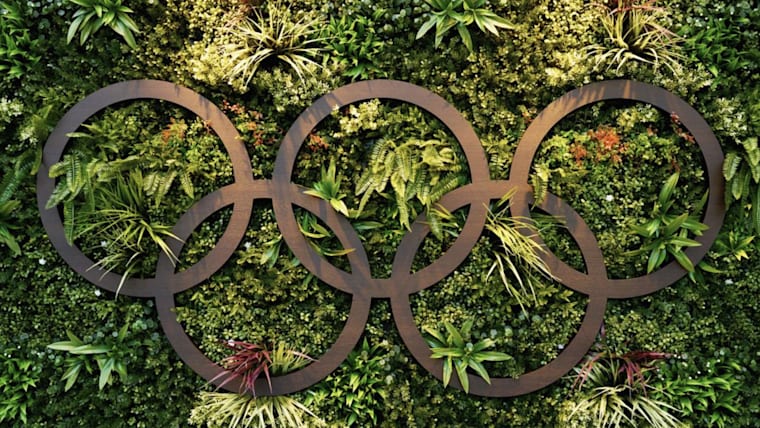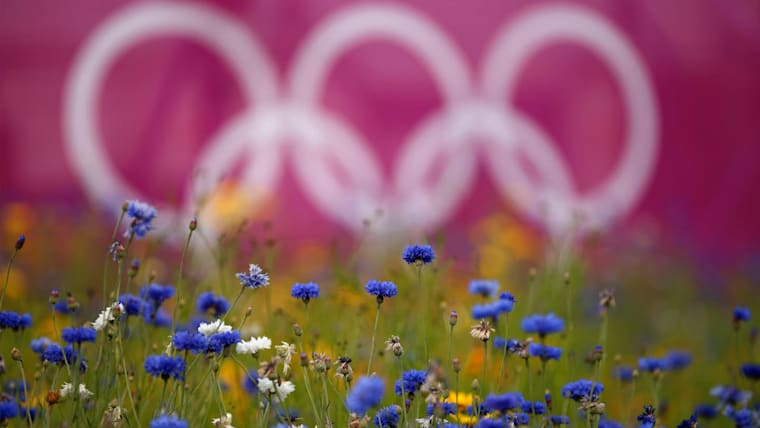The IOC Climate Action Awards 2024
The awards are supported by Worldwide Olympic and Paralympic Partner Deloitte across three categories. TOP Partner Deloitte is providing its unique expertise to develop programme criteria and prize offerings for winners, while working towards its own respective climate goals.
SUPPORTED BY DELOITTE
Collaborating to accelerate the reduction of emissions by IFs, NOCs and athletes that use innovation and education to create more sustainable futures.
Prize:
-
NOCs and IFs: Professional advisory services, up to USD 25,000, through a workshop to accelerate and scale your sustainability initiative and increase its climate impact.
-
Athletes: Mentoring relationship over six months, approximately two hours a month, with a regional Deloitte sustainability consultant to help develop your programme and advance its climate impact.
Athletes
Winners
Imogen helped to launch the Clean Water Sport Alliance to improve river health and water quality, as part of the UK National Training Centre sustainability group. As an ambassador for the Rivers Trust, Imogen has also spoken at a number of events across the UK to raise awareness and educate athletes on their responsibilities.
“Sport is such a team effort, and so is sustainability. I am so grateful to the amazing people and organisations who have helped me speak up and use my athlete's voice for more than just sport. I hope to continue inspiring others to take action, both on and off the field of play.” - Imogen Grant, Olympian
Lina is educating professionals from government corporations and NGOs on how they can apply a sustainability lens to everything they are doing. Through her Climate Executive Coaching business, she educates leaders in these sectors to build the skills to influence and inspire climate action. In just two years, Lina has coached over 2,000 people in 30 countries and across 60 organisations. Lina is also supporting fellow athletes and NOCs, training them individually in climate solutions.
“The journey to becoming an Olympian taught me that challenges are the very catalysts that push us toward greatness. Today, as we face the greatest challenge of all—the climate crisis—this lesson feels more urgent than ever. Solving it will require each of us, in our unique roles, to make decisions through the lens of sustainability and contribute our part to the solution. I am grateful to the IOC and Deloitte for creating a platform that champions strong leadership and collaboration." - Lina Taylor, Olympian.
National Olympic Committees
Winner
Swiss Olympic
Swiss Olympic has created a carbon reduction plan and, working on minimising its own emissions, the NOC is focusing on providing funds to its national federations, their clubs and partner organisations through the “Swiss Olympic Climate Fund”, to support their carbon reduction efforts. For example, the NOC has contributed to the funding of a heat pump system for a 50-year-old swimming pool in Frauenfeld, Thurgau, which has the potential to save 500 tons of CO2 annually. The Swiss Olympic Climate Fund has also helped fund an electric bus for the Ticino Group of Blind and Visually Impaired Sportsmen. Moving forward, the NOC is aiming to support 100 other projects across all its member and partner organisations, leading to a long-term plan of reducing emissions across all sports within Switzerland.
"We are thrilled to receive the IOC Climate Action Award. It shows us that we chose the right path with our innovative Swiss Olympic Climate Fund and hope to inspire other sports organisations to take action against climate change." - Roger Schnegg, CEO Swiss Olympic
Highly commended
Mauritius National Olympic Committee
The Mauritius National Olympic Committee has been distinguished in the “Highly Commended” category, recognising the innovative nature of its efforts to reduce emissions. The NOC developed a comprehensive carbon footprint reduction plan focusing on travel and procurement. Key initiatives include a local community-based project which has encouraged around 50,000 people to switch from plastic bottles to glass bottles in order to reduce plastic waste, and the design of a “bioclimatic gym” that uses sustainably sourced PEFC-certified wood, 100 per cent renewable energy and natural air ventilation instead of carbon-heavy air conditioning – the first of its kind in Mauritius.
International Federations
Winner
International Hockey Federation (FIH)
The FIH is working with the artificial turf industry to develop a new technology – Dry Turf – that reduces the amount of water needed for hockey pitches, achieving a 40 per cent reduction from London 2012 to Tokyo 2020, and an anticipated further 30 per cent reduction for Paris 2024. The aim is to replace 2,000 water-based artificial hockey pitches globally, saving approximately 7.6 billion litres of water per year. The FIH has also introduced “wet balls” that release water at the point of contact between the ball, the surface and the stick, to ensure the sport can be played at the highest level on dry turf. The project is part of the FIH’s wide-ranging sustainability strategy and a comprehensive carbon reduction plan, which includes the first ever carbon-zero artificial turf which is currently being used at the Olympic Games Paris 2024.
“We are extremely honoured and grateful to receive this very high distinction from the International Olympic Committee for the efforts to reduce the impact on the environment generated by the practice of our sport. Sport has a major role to play in building a better future for society and this includes protecting the environment. We are determined to be an important stakeholder in this area.” - FIH President Tayyab Ikram
Highly commended
International Biathlon Union (IBU)
The International Biathlon Union (IBU) has been been distinguished in the “Highly Commended” category, recognising the innovative nature of its efforts to reduce emissions. The Federation has been working with TV broadcasters, in collaboration with the European Broadcasting Union, to measure their carbon footprint during the 2023/24 World Cup season and identifying initiatives they can implement to reduce emissions in the future, with the aim of providing learnings for other sports. The IBU is the first Olympic IF that has looked at systematically reducing its major events’ broadcasting emissions – an area that is often deemed difficult to address. The project is part of the IBU’s comprehensive sustainability strategy, which includes a commitment to reduce the sport’s climate impact by 50%. Their strategy takes into account IBU’s own activities, but also IBU events, and the activities of member federations, partners, sponsors, media and fans.



